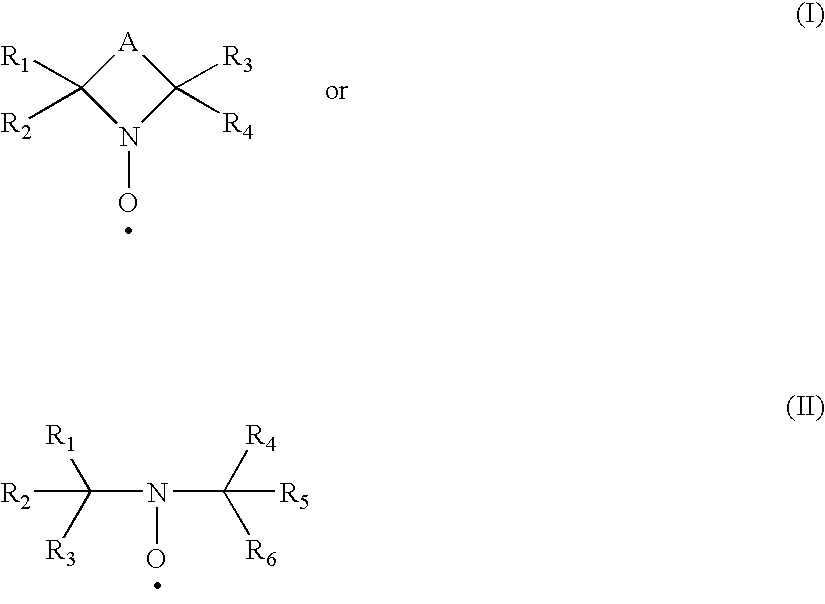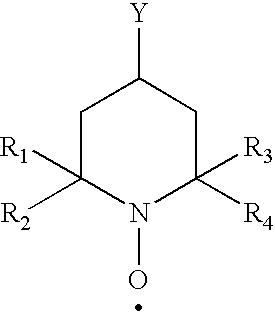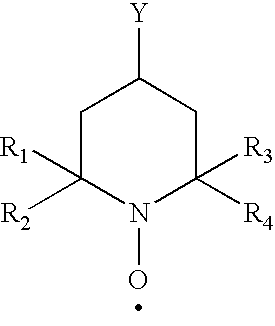Polysaccharide aldehydes prepared by oxidation method and used as strength additives in papermaking
- Summary
- Abstract
- Description
- Claims
- Application Information
AI Technical Summary
Benefits of technology
Problems solved by technology
Method used
Image
Examples
example 1
Oxidation Procedure On Granular Starch In Aqueous Slurry:
Oxidation was carried out in aqueous conditions using a 4-neck, round-bottom flask equipped with an overhead stirrer using the following procedure. The nitroxyl radical TEMPO (0.44 g, 1 mole % based on moles of starch ASU) and sodium bromide (2.9 g, 10 mole %) were added to an aqueous starch slurry [50 g fluidity cationic waxy maize starch (45.5 g dry; 0.28 mole ASU) in 100 ml water]. The system was cooled to below 5° C. with an ice-water bath. The pH of the mixture was adjusted to 9.5 with sodium hydroxide (4% solution). Sodium hypochlorite (24.8 g; 4.2% solution; 5 mole %), whose pH was also adjusted to 9.5, was then introduced into the reaction mixture by dropwise addition at a rate so as to maintain the temperature of the reaction mixture <15° C. with an ice-water bath (ca. 10 minutes). The pH of the slurry was held substantially constant at 9.5 through this addition process by the addition of 0.99 N sodium hydroxide ...
example 2
Oxidation on Dispersed (Cooked) Starch:
To a 700 g cooked dispersion of 6 weight percent fluidity waxy maize starch (42 g starch or 0.26 moles of ASU) in water was added 55 mg of 4-acetamido-TEMPO (0.1 mole % based on moles of starch ASU) and 2.67 g sodium bromide (10 mole percent). The homogeneous solution was cooled to 5° C. and its pH was raised to 9.5 using aqueous sodium hydroxide. Sodium hypochlorite (44.7 g of 13% solution; 30 mole %), whose pH was also adjusted to 9.5, was then introduced into the reaction mixture by dropwise addition at a rate so as to maintain the temperature of the reaction mixture at <15° C. with an ice-water bath (ca. 20 minutes). The pH of the solution was held constant at 9.5 throughout this addition process with 0.99 N sodium hydroxide solution (20.8 ml) using a Brinkmann Metrohm 718 STAT Titrino (pH-stat). The oxidation was essentially complete once all of the hypochlorite solution was added and the pH of the system had stabilized. A small volum...
example 3
The procedure described in Example 1 was repeated several times under similar conditions on fluidity cationic waxy maize starch (3-chloro-2-hydroxypropyltrimethylammonium chloride modified, 5.3 mole % based on moles of starch ASU). This was done in order to determine the effect of oxidation pH and temperature on the C-6 aldehyde (—CHO) and carboxyl (—COOH) functional content of the products. In these cases the addition rate of the NaOCl oxidant was adjusted so as to keep the reactions at prescribed temperatures using an external cooling bath. Table 1 lists the conditions and the results obtained.
TABLE 1The effect of oxidation conditions on the C-6 aldehyde and carboxylicacid content of fluidity cationic waxy maize in the slurry stateOxidantActiveProductchlorineOxidation—CHO—COOHEquivalentNaOCltemperatureOxidationcontentcontent(g / mole)*(mole %)*(° C.)PH(mole %)*(mole %)*3.5510510.54.22.93.551058.54.52.73.551059.54.82.63.5510109.54.42.83.5510159.54.12.93.5510259.51.44.3*based on moles...
PUM
| Property | Measurement | Unit |
|---|---|---|
| Temperature | aaaaa | aaaaa |
| Temperature | aaaaa | aaaaa |
| Temperature | aaaaa | aaaaa |
Abstract
Description
Claims
Application Information
 Login to View More
Login to View More - R&D
- Intellectual Property
- Life Sciences
- Materials
- Tech Scout
- Unparalleled Data Quality
- Higher Quality Content
- 60% Fewer Hallucinations
Browse by: Latest US Patents, China's latest patents, Technical Efficacy Thesaurus, Application Domain, Technology Topic, Popular Technical Reports.
© 2025 PatSnap. All rights reserved.Legal|Privacy policy|Modern Slavery Act Transparency Statement|Sitemap|About US| Contact US: help@patsnap.com



